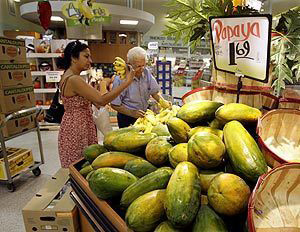 |
 |
 |
 Health & Beauty | October 2007 Health & Beauty | October 2007  
Campaign Puts a Healthy Accent on Good Eating
 Jaweed Kaleem - Miami Herald Jaweed Kaleem - Miami Herald
go to original


| | Celia Beveau shops for bananas at the Publix on West 49th Street in Hialeah. The Latino Nutrition Coalition launched its healthy-eating guide campaign Thursday in South Florida. (Charles Trainor Jr/Miami Herald) |
The Latino Nutrition Coalition brought its national campaign to South Florida this week, handing out thousands of bilingual healthy-eating guides along with this message: more rice and beans, fewer fast-food burgers.

"Health and healthy eating are incredibly important issues that need to be addressed for Latin Americans," said Liz Mintz, director of the Boston-based group.

Diabetes is a major concern: Ten percent of Hispanics reported having been diagnosed with the disease in the Centers for Disease Control and Prevention's most recent National Health Interview Survey, compared with 5 percent of non-Hispanic whites.

Boston's Joslin Diabetes Center predicts that half the Hispanic children born in the United States today will eventually develop diabetes, which is most often linked to obesity.

"In the U.S., calories and fat are inexpensive to come by," said Mintz, who grew up in Colombia. "We have to switch and think of what we can eat healthily. We're also trying to make people aware that eating in traditional ways is very healthy."

The push-pull between traditional and fast-food diets plays out in Celia Bereau's family. The pharmaceutical-company worker from Hialeah says she tries to eat healthfully, but she worries about her daughter.

"If I don't eat rice and beans, I feel like I haven't eaten," said Bereau, who emigrated from Cuba six years ago, while her 20-year-old daughter "doesn't eat much, but she likes lots of fast food."

Camino Mágico (Magic Road), the colorful 16-page guide the coalition distributed at its kickoff event Thursday at Hialeah's Publix Sabor supermarket on West 49th Street offers both traditional and trendy food ideas, from arroz con pollo and shrimp tacos to a tortilla-based snack filled with peanut butter and trail mix.

Shoppers sampled some of them at tasting stations set up around the store. Miami registered dietitian Cathy Clark-Reyes was on hand to answer shoppers' questions, and chef Edgar Leal of Coral Gables' Cacao Restaurant demonstrated a recipe: red snapper with a risotto made from quinoa, a protein-rich Andean grain.

BASED ON PYRAMID

Camino Mágico is based on the Latin American Diet Pyramid, a Latino Nutrition Coalition adaptation of the U.S. Department of Agriculture's food pyramid that incorporates images of Hispanic favorites like tropical fruits and corn tortillas.

"Many times Latin American people see the [USDA] pyramid and they say, `What do I do with this?' " Mintz said.

The cover of the passport-sized booklet shows a mother and child entering a supermarket, "the magic road" to good health.

Created under the auspices of the Oldways Preservation Trust, a Boston-based food and nutrition think tank, the nonprofit Latino Nutrition Coalition is made up of more than a dozen food industry groups, from Goya and General Mills to Mission Foods and the USA Rice Federation. Their name-brand products are used in Camino Mágico's illustrations.

The coalition has distributed 200,000 copies of the guide in Houston and Chicago since launching it in May and hoped to hand out 2,000 Thursday in South Florida, its third target market.

"Miami is our first city that isn't primarily Mexican, so we've changed some recipes and sections in the guide," Mintz said. "It's less of a fajita culture and more of a rice and beans culture."

The pamphlet uses a dinner plate to illustrate a properly balanced meal: half fruits and vegetables, one-fourth protein (a grilled chicken breast) and one-fourth starches (rice and a tortilla).

"Most people have a very distorted view of portion sizes and healthy eating habits," said Donna Shields, a Key West-based dietitian who is on the coalition's advisory panel and attended the 2005 Latin American Diet Summit in Mexico City at which it was formed.

ALREADY ON BOARD

A day before the kickoff event, some Publix Sabor shoppers said they had already gotten the healthy-eating message.

"I try to keep foods fat-free and low calories," said José Rodriguez, 72, who was buying sugar-free oatmeal cookies for his grandchildren.

Mirta Reyes, who came to the United States from Nicaragua in 1979, was shopping with her 10-year-old grandson, Ignacio.

"Our family has been vegetarian for a long time," she said.

jkaleem@MiamiHerald.com | 
 | |
 |



